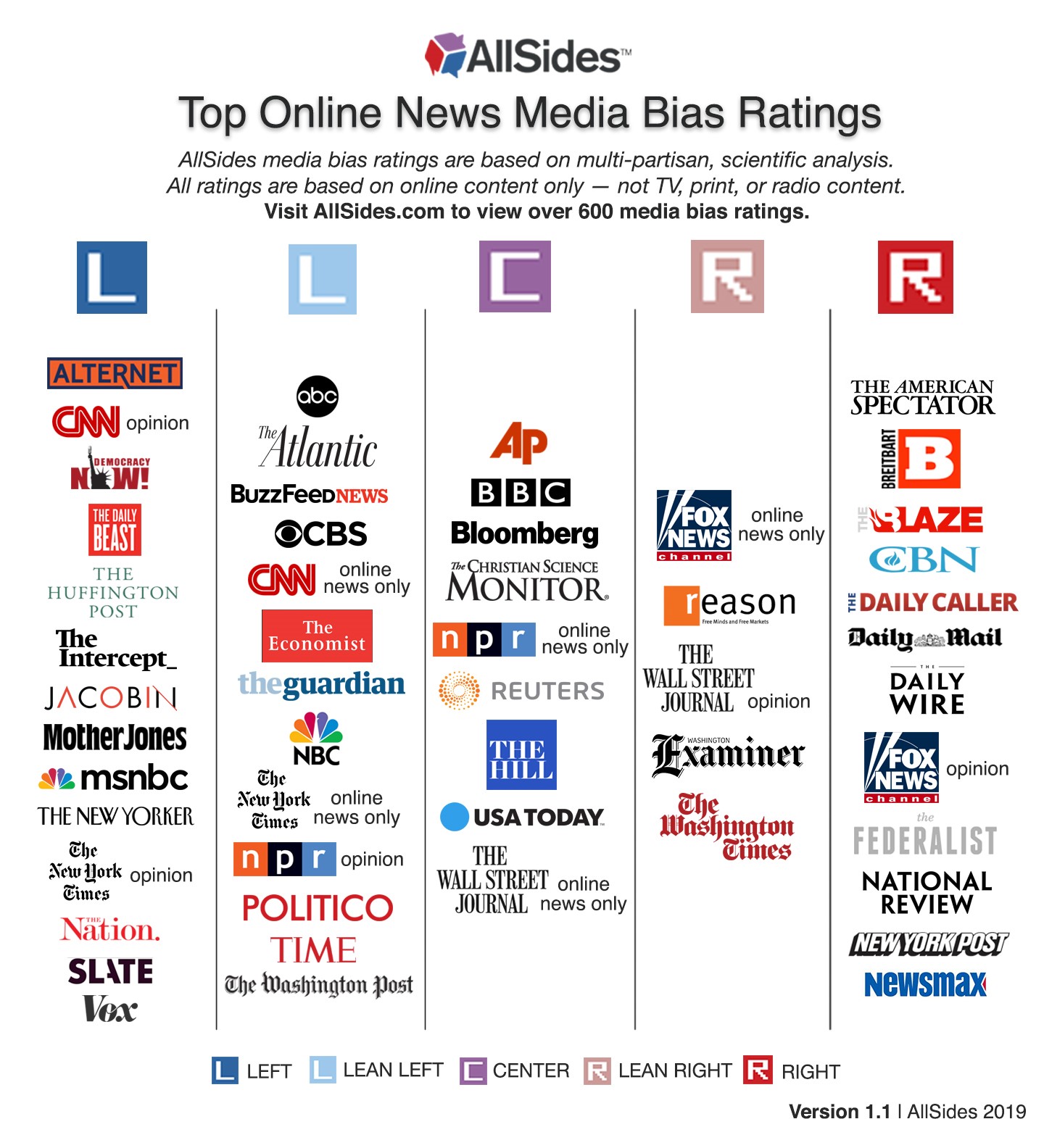Greg Steinbrecher
At Politicon last year, I attended a panel nebulously entitled “Fake News vs. The World.” In a contentious moment, a panelist going by the name “The Roaming Millennial” (né Lauren Chen) badgered reporter Annie Linskey about an article Ms. Linskey had just published entitled “Elizabeth Warren Releases Results of DNA Test.” The brouhaha was over a math error in the first version of the article: Linskey originally reported that Senator Warren’s DNA test concluded that she was between 1/32 and 1/512 parts Native American, when in fact the test showed that she was between merely 1/64 and 1/1024 parts Native American.
To the conservative Ms. Chen and to other right-leaning pundits and outlets, Linskey’s mistake was an obvious instance of media bias: the liberal media, represented in this case by Ms. Linskey, was aware that Warren’s claim to Native American ancestry was miniscule, but still managed to fudge the numbers in a way that made it seem that Warren has more Native American blood than she actually does, so that Warren’s well-known publicized claims of Native American ancestry would not appear to be entirely ridiculous. It looked, that is, like the liberal press manipulating facts in order to protect a viable presidential candidate from total embarrassment. Given the ridicule Warren faced from all sides after the rollout, and her current paltry polling and fundraising numbers, if that was the media’s intention, well…it didn’t work.
The incident between Chen and Linskey reminded me of those times I’ve insincerely apologized to my girlfriend after a fight without really believing that I’m wrong. I say “sorry,” but she gets mad over the tone with which I said it. I reply, “I don’t quite know what you’re getting mad about, because I said I’m sorry.” To which she says, “But I want you to mean it.”
At Politicon Ms. Linskey pointed out and repeated that the paper issued a correction, but for the conservative Ms. Chen, that wasn’t sufficient. She seemed to be implying that Ms. Linskey didn’t mean the correction– her true intent was the endeavor to soften the blow for Senator Warren, which epitomizes the liberal agenda of the mainstream press as a whole. And Linskey, Chen seemed to argue, should be sorry for that.
I got a chance to briefly speak with Ms. Linskey after the panel. Despite being a Red Sox fan, she seemed like a sweet person and a good reporter, earnestly embarrassed by her mistake, if for no other reason than that her bosses had had to issue a correction on a high-profile story. She did not seem scheming or manipulative or intent on bending facts for her preferred political team, any more than anyone else. Regardless, Ms. Chen had implied during the panel that Linskey was guilty of nothing less than that.
That got me thinking. What are the underlying issues that caused conservatives to “pounce” (more on that later…) on this one relatively small mistake? Why do conservatives get up in arms at instances—perceived or otherwise—of leftwing bias in the media? And how can liberals and conservatives come to some sort of settlement over this crucial front of the culture war?
In order to proceed, though, we should all acknowledge one major sticking point, which might cause some discomfort: all things considered, on balance, the media does in fact have a collectively liberal bias, outside those parts of it that explicitly cater to conservatives. For one thing, the majority of reporters have liberal tendencies. Studies differ as to how many journalists identify as left-leaning, but a telling statistic is that in 2013, only 7.1% of journalists identified explicitly as Republicans, while 28.1% identified explicitly as Democrats. Just about half identified as Independent—but I would venture to guess that most, if you really dug in, would confess to possessing a liberal worldview.

Allsides.com’s Media Bias Chart.
But even if you don’t accept that last point, or don’t think a reporter’s personal political leaning necessarily affects their effectiveness at producing neutral work, a quick look at the Media Bias Chart, released by AllSides.com, suggests the question of liberal bias is layered. The chart implies, at first glance, that the left, center, and right have equal representation in media.
But if you look at those outlets in the “Lean Left” column of the chart—ABC, CBS, NBC, CNN, The New York Times, the Washington Post, Politico, Time, etc.—those outlets are the 800-pound-gorillas in the room of our media landscape, easily accessible at any newsstand, on TV around the clock, and the first results of any Google search. They’re “mainstream,” if you will. Meanwhile, in the “Lean Right” and “Right” columns, you have Fox News and The Wall Street Journal, and a bunch of smaller newspapers, magazines, and blogs. This is unscientific to be sure but, for what it’s worth, I hadn’t previously heard of many of the outlets on the right side of the chart—and I’m someone who has been making an effort to consume conservative media for the last few years! I’m at least somewhat familiar, though, with every outlet on the left.
So, most reporters lean left (or, at the very least, they don’t lean right,) and the outlets many of them work for generally lean left as well. Why, then, are many liberals reluctant to admit that the media might have a liberal bias? It seems to me that many of those inclined to lean left perceive the readily available information coming from the main media outlets as “normal” or “just the way it is.”
A quick hypothetical. Let’s say, for simplicity’s sake, that there were two primary partisan narratives about the tax bill President Trump signed in 2016: that liberals portrayed it as intended to make the rich richer, while conservatives portrayed it as designed to make America a more competitive place to start a business. You’re a news-savvy person who wanted to inform yourself about the bill, so you browsed some of the easily available content out there.
If you picked up a major-market newspaper, you probably read an article written by a reporter who, more likely than not, leans left. You flipped to the opinion page and read the liberal editorial board’s collective opinion. Throughout the day you heard commentary from a rotating coterie of reporters and pundits who, unless you specifically tuned in to Fox News, were most likely making liberal talking points, or at least coming from liberal backgrounds. Then, during prime time, if you flipped to any of the main broadcast news-hours, you probably heard from a left-leaning source. Before you went to bed, you had the opportunity to watch one of several liberal late-night comedians, molding straw man arguments into liberal punchlines, eliciting laughter from a liberal audience. So all day, on the most easily accessible and omnipresent media networks, you heard the tax bill framed along the lines of “It’s designed to make the rich richer.” That means if you’re somebody more inclined to liberal opinions in the first place, all you heard throughout the day was confirmation of your existing beliefs. And, I would argue, that tends to make any other beliefs about the issue—like tax cuts making America more competitive—odd or even fringe, something “those other people” believe.
This drives people on the right crazy. To conservatives, conservative beliefs are normal, and the commanding heights of culture should repeat these beliefs over and over on a daily basis. Sure, conservatives can turn to their own media—Fox News, the Wall Street Journal opinion page—but these conservative outlets aren’t as all-pervading as liberal ones like The New York Times and CNN. It can feel like the mainstream media possesses, and abuses, the complete freedom to define the terms of the debate, and uses that status to paint conservatives as out-of-touch or misinformed. In turn, this makes conservatives feel powerless to make a dent in the consensus emanating from these elite institutions. And they stick to their own conservative media networks, where at least their views are broadcasted.
This, I think, is why conservatives sometimes harp on mistakes made in the media that seem to benefit liberals, as in Ms. Chen’s implication of Ms. Linskey’s liberal bias at Politicon. This is why people who lean right are quick to point out when the mainstream media doesn’t cover, say, a vote in the legislature that many conservatives felt was extraordinarily important, on a bill that they frame as protecting newborn babies from the possibility of infanticide. They feel like people with a conservative point of view don’t get as much a chance as liberals do to define the terms of debate, or to move the needle on the issues of the day. That a certain, secular-liberal worldview gets the spotlight all to itself, and that conservatives have no way to challenge it, or to shift its focus, other than to grouse offstage in other venues, are obvious reasons for conservatives to see themselves as a minority in the media world.
Incidentally, this is also why conservatives are quick to point out instances of “Republicans Pounce” headlines. If you’re not familiar with the trope, it goes something like this: if a Republican does something bad the story is framed simply to put the focus on the Republican doing the bad thing. For example, USA Today’s headline “Republican Congressman Matt Gaetz Tweets Apparent Threat to Michael Cohen, Alleging Affair.”
But when a Democrat makes a faux pas, the story is framed to focus on the Republican reaction to the gaffe, instead of the actual mistake itself. So when Rep. Alexandra Ocasio-Cortez botches the rollout of her Green New Deal it’s: “Ocasio-Cortez Team Flubs a Green New Deal Summary, and Republicans Pounce.”
Once you start looking for this device you start to see it all over the place, such as when a conservative activist at Berkeley was punched in the face and the Washington Post ran the (since changed) headline “A Conservative Activist Was Punched in the Face at Berkley. The Response Enraged the Right.” It’s become such a banal trend that conservatives on Twitter have turned it into a sardonic meme.
Conservative frustration is understandable. We want people to see the world the way we see the world. And I think we all, with varying degrees of awareness of this desire, want a hypothetical, uninformed person to be able to come around to our side of things. Politics, as the saying goes, is a team sport, and if “our side” can convince some fresh recruits to pick our team, then a battle has been won in the larger war. It’s why we retweet opinions we like, to be seen by no one in particular. Plus, it’s more fun to scroll down a timeline or pick up a newspaper when the general consensus of the outlet aligns with your own worldview. If it doesn’t, it is at the very least desirable that your point of view gets a fair shake in the marketplace of ideas, rather than being ignored or condemned. Again, conservatives feel like they don’t get that fair shake, that their voices are drowned out.
Before wrapping up, a quick word. I’ve mostly focused on conservative grievances with the mainstream media. It’s an issue that conservatives are highly attuned to that liberals tend to roll their eyes at, and I really wanted to explore that discrepancy. But I could write another whole article about legitimate gripes liberals have with conservative media. If liberals use the breadth of liberal media to validate their views, conservatives tend to use the niche status of conservative media to make their views seem more authentic. In their view liberals are sheep who conform to the onslaught of predictable information emanating from the mainstream press, while this conservative magazine is the truth, man. This can create a bunker mentality which runs the risk of elevating less-informed or legitimate sources just for being heterodox.
It goes without saying that none of what I’ve described above helps to diminish or manage polarization. There are things I think liberals in the media can do to help cool tensions.
For a start, a lot of conservatives would probably appreciate liberals admitting the left-leaning tendencies in the biggest media institutions. More than anything else, that would go a long way in helping re-build trust.
Instead, everyone gives lip service to neutrality and objectivity, and avoids acknowledging their own biases. But neutrality is, frankly, overrated. For most of American history, an everyday citizen would be able to identify the liberal and conservative periodicals—the Los Angeles Times vs. the Daily News, the Chicago Tribune vs. Chicago Sun-Times, etc. It wasn’t until the corporate consolidation and hegemony of a few main networks, publishers, and firms in the mid-20th Century that neutrality became a coveted buzzword. And for some time, a few decades ago, some of them could claim the mantle of ‘neutrality’ more or less accurately, at least in being fair to the various main sides of American opinion.
As those outlets became more niche in the last few decades, they should have also become more open about their ideological leanings. It would be good for them to start admitting that much of their commentary leans left now. When that happens, conservatives shouldn’t use that new transparency as an opportunity for “gotcha” moments; they should instead focus on making conservative channels more competitive in an expanding marketplace, where bias is admitted and no one claims to be more objective than they are. This fracturing, premised on admission of bias, could help viewers to see narratives emanating from the biggest media players each seem more like “a” point of view rather than “the” point of view. And once that’s established, real public debate can begin.
In the meantime, we need to make it acceptable again to see something, somewhere, that promulgates a worldview that’s different than ours, without immediately condemning it. Right now, everyone on both sides, especially on social media, seems primed to freak out the moment they see a perspective contradictory to their own, or a sensational story confirming their negative opinions of the other side. That won’t change in the larger culture overnight. But we can start to change ourselves.
Take a breath when you see someone supporting Howard Schultz or Donald Trump or Alexandria Ocasio-Cortez, or doubting that climate change is as big a deal as doomsayers believe it to be, or wondering whether borders are arbitrary and meaningless—and realize that it doesn’t really matter if people think those things. That might sound like an argument for fatalism or apathy, but it’s not. The way a national narrative consensus is built from a smattering of independent, elite institutions, and developed online by mass opinion, is largely out of your control. Which means that it’s largely not worth being aggravated about it.
By all means, honor your beliefs. But those beliefs are best serviced by entering into discussions with those you’re closest to with an open heart and a willingness to listen and learn. So tend to your own plot of land and remember that the things of most value are what you experience firsthand everyday: the friends you play board games with on the weekends, the dog lying at your feet, the sunset that inspires you to write a poem. We live in a country where people are still relatively free, and have pleasant, non-political day-to-day interactions with their neighbors.
And that remains true even if someone, somewhere, believes something that you find reprehensible.
Greg Steinbrecher (@GregSteinbreche) is the Lead Social Media Manager for Braver Angels. He’s an actor living in Los Angeles, where in his free time he indulges his interests in history, baseball, jazz, political philosophy and podcasts about all those things and more.




